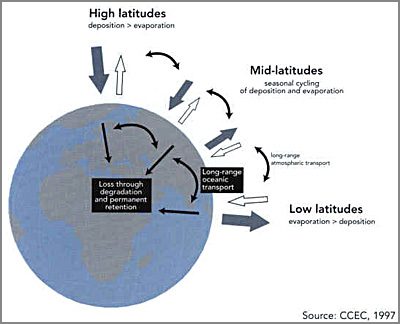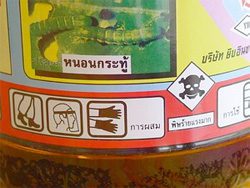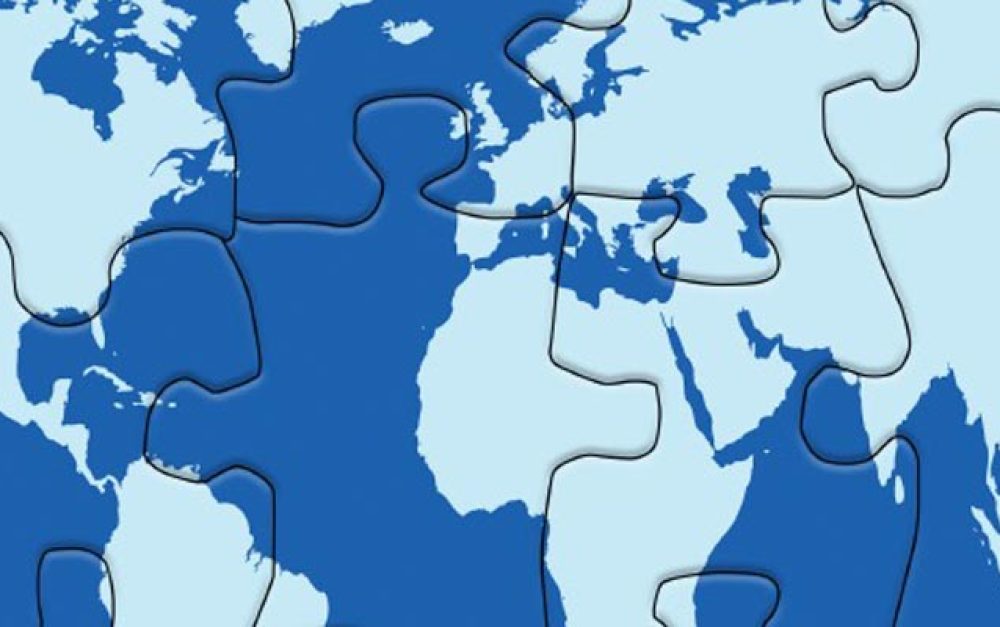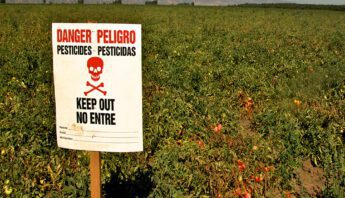National borders mean nothing to pesticides.
- A pesticide sprayed on roses in Ecuador contaminates the blood of children in Iowa.
- Fruits and vegetables imported by Europeans carry residues of pesticides long banned on the continent.
- Pesticides used in the U.S. and around the world taint the breastmilk of Inuit women in the Arctic.
This is why protecting people from pesticides requires coordinated, global action from concerned citizens and experts around the world.
Dangerous international travelers
 Persistent organic pollutants, or “POPs,” are chemicals that persist in the environment for years – sometimes decades. POPs build up in all living creatures, and become more concentrated as they move up the food chain. Most can be passed from mother to child during pregnancy and breastfeeding, and are linked to a range of serious health effects, including birth defects, infertility and cancer.
Persistent organic pollutants, or “POPs,” are chemicals that persist in the environment for years – sometimes decades. POPs build up in all living creatures, and become more concentrated as they move up the food chain. Most can be passed from mother to child during pregnancy and breastfeeding, and are linked to a range of serious health effects, including birth defects, infertility and cancer.
POPs can travel long distances in global air and water currents, settling eventually in the polar regions. As a result, Indigenous peoples in the Arctic carry astonishing levels of POPs in their blood and breastmilk, even when the chemicals have never been used in the region. Traditional foods such as meat from whales, walrus and seals can be so contaminated that it qualifies as hazardous waste.
Throughout the 1990s, PAN worked with partner groups around the world to win the Stockholm Convention on Persistent Organic Pollutants (POPs Treaty), which targets this entire class of chemicals for global elimination. The POPs Treaty sets timetables for phaseout of target chemicals, provides assistance to help countries eliminate POPs, and works with scientists to expand the list of target chemicals.
Treaty bans persistent poisons
Global phaseout of many of these persistent chemicals is well under way. Twelve chemicals were initially targeted for phaseout under the POPs treaty, including nine pesticides from PAN’s original “Dirty Dozen” campaign. The treaty includes a short-term exemption for use of DDT to control malaria-carrying mosquitoes, and mobilizes resources to help countries that need help shifting to safer and more effective approaches to malaria control.
Chemicals in the POPs Treaty
Original POPs Treaty list: aldrin, chlordane, DDT, dieldrin, endrin, heptachlor, hexachlorobenzene, mirex, toxaphene. Plus PCBs and the industrial byproducts dioxins and furans
New chemicals added in 2009: lindane, chlordecone, hexabromodiphenyl ether and heptabromodiphenyl ether, tetrabromodiphenyl ether and pentabromodiphenyl ether, and hexabromobiphenyl; pentachlorobenzene and perfluorooctane sulfonic acid, its salts and perfluorooctane sulfonyl fluoride
<>
<>
<>
<>
<>
<>
<>
<>
<>
<>
In May 2009 nine new chemicals were added to the treaty’s elimination list, including the pesticide lindane. Already banned in dozens of countries around the world, lindane’s use was phased out on U.S. farms in 2006. The treaty allows use of lindane shampoos and lotions to control lice and scabies for another five years; these products have been banned in California for almost a decade.
The POPs treaty’s scientific committee agreed in October 2009 to consider adding the pesticide endosulfan to the list. Once used widely worldwide on cotton, vegetables and other crops, endosulfan has already been banned in more than 60 countries. After a multi-year campaign by PAN and our partners, EPA announced in May 2010 that U.S. use of the chemical will be phased out.
The U.S. signed the POPs treaty in 2001, but has yet to join the 170 countries that have officially adopted the agreement.
Circle of Poison: The global pesticide trade
 The U.S. shipped nearly 1.7 billion pounds of pesticide products to other countries from 2001-2003 – more than 32 tons per hour. Nearly 28 million pounds of these pesticides are forbidden for use in the U.S.
The U.S. shipped nearly 1.7 billion pounds of pesticide products to other countries from 2001-2003 – more than 32 tons per hour. Nearly 28 million pounds of these pesticides are forbidden for use in the U.S.
Millions of barrels of pesticides travel the global marketplace, and then re-circulate as residue on food and fiber. Tackling this “circle of poison” has galvanized PAN activists around the globe since the network’s early days.
Engaging directly in international policy debates in the 1980s, PAN experts proposed that importing nations should be informed when pesticides were banned in other countries – and be given the right to refuse the import of such chemicals.
The UN Food and Agriculture Organization took up the idea, and began implementing a notification procedure for banned chemicals. The process eventually became international law with the signing of the Rotterdam Convention on Prior Informed Consent (PIC) in 1998. The PIC Treaty has now been adopted by more than 130 countries.
Like the POPs Treaty, the Rotterdam Convention has a scientific process for adding new chemicals to the list.







